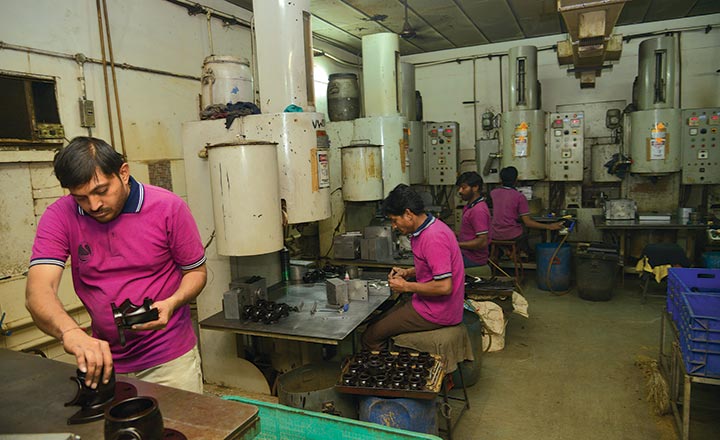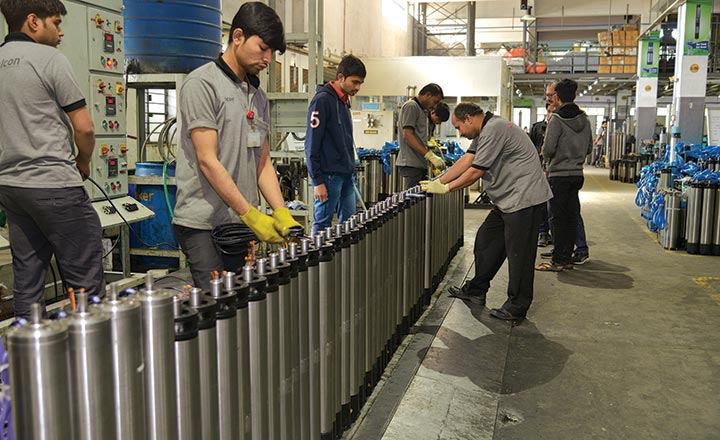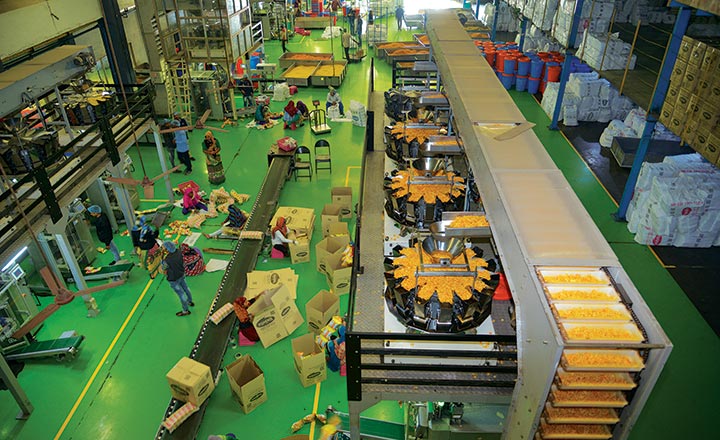If there was one thing that the world knows about Gujaratis, it is that business sensibility runs in theirblood. And Rajkot, is an apt representation for the same. While the veparis there are passionate about their business, their love for food knows no boundaries. Right as you enter the city — the main business hub — the aroma of food almost lures you, towards its delicious Gujarati cuisine from farsans like ganthia to a kathiawadi thali. As hardworking as they might be, lunch breaks are sacrosanct — dare you call or set up a meeting between 1 PM and 3 PM. “Even if you try to call me during that time, you won’t reach me, or any businessman in this city. We take our lunch breaks very seriously,” laughs Rajan Vadalia, managing director, Vadalia Foods.
Speaking of food, Rajkot is known for its mouth-watering namkeen with one of the biggest players in the industry, Balaji Wafers, based there. But the implementation of the Goods and Services Tax (GST) has not spared even this 36-year-old company that clocked revenue of Rs.1,600 crore in FY17. More than anything else, the food industry, which paid VAT of 5%, now pays GST of 12%. “Most players have passed on the GST to their consumers, but we haven’t increased our prices,” says Chandubhai Virani, founder, Balaji Wafers.
However, absorbing the GST disruption and rise in taxation was tough for newer players like Vadalia Foods. The company that was set up in 2014, clocked a turnover of Rs.70 crore in the last fiscal year, but due to the implementation of GST, achieving their FY18 target of Rs.100 crore, will be tougher. “We cater to the labour class — mainly factory workers. And for their 5 PM tea break, companies would provide our snacks. However, post GST — these factories shut down by 4 PM and there are two weekly offs, instead of one. Hence, the larger chunk of our customers have stopped consuming our products,” explains Vadalia .

Meera Wafers, an even smaller company, with a turnover of Rs.1.6 crore last year, had to increase their prices due to GST, which led to their demand falling. “We had to compensate for the same, by expanding outside Rajkot to Ahmedabad, Kutch etc. to keep our sales running. Currently, we only make potato-based products, but in FY19 we are planning to move into different types of chikkis,” says Tushar Virani, owner, Meera Wafers.
Vadalia points out how increasing raw material costs have also impacted the industry. While prices for besan, palm oil have increased significantly, it is potatoes that set them back the most in the last fiscal year. They buy LR-grade potatoes, which is available from February to March, post which the stock is stored in cold storage till September. “We get stock for the rest of the year from Manchar, Maharashtra. But due to the heavy rains, potatoes that are sold at Rs.12 per kg, were sold at Rs.36 per kg,” adds Vadalia.
Along with rising prices of raw materials, frequent power cuts have become a ball and chain for companies like Balaji and Meera, in their plants based on the outskirts of Rajkot. For Balaji — that has the capacity to process 8 lakh kg of potato wafers per hour and 10 lakh kg snacks in the same time — power loss for a minute could cause major losses. Virani explains, “If the time between the power cut and the generator beginning, exceeds a minute all the food processed during that time will be wasted.” For a smaller company like Meera, to lose out on their output is even tougher, not to mention the expensive generator.
Currently, Rajkot has 150-200 units in the foods and namkeen industry, with a cumulative turnover of about Rs.3,000 crore last year. There are about seven to eight medium-sized players, and the rest are all small and micro businesses. Balaji, being one of the largest, has already started moving across the rest of India, and they are soon planning to move to international markets as well. Virani remains optimistic about GST, “The troubles might continue for five to six years, but later taxes will reduce.”
Rajkot is known for its multi-industry dynamics and while, food is one of the most prominent industries there, it is also a foundry hub. Of the total turnover of the cluster, which is Rs.35,000 crore, Rs.2,500 crore is foundry, Rs.3,000 crore is foods and Rs.1,500 crore is submersible pump manufacturers. And the rest is constituted by a whole range of sectors ranging from gems and jewellery to diesel engines, plastic industries, automotive parts, chemicals and so on.

Up in smoke
It was only in 1996 that foundries started getting established in Rajkot and almost a decade later, they are struggling to maintain their margin due to rising input costs. Iron ore which was priced at Rs.22/kg six months ago is Rs.32/kg today and is expected to rise further.
Foundries are both capital and labour intensive. The abundance of skilled labour in Rajkot, around 1996 was one of the reason why, the industry initially flourished here. But now, finding reliable and skilled labour is a task for foundries. “Most of the workers are from UP and Bihar, but retaining these workers is tough, especially during Holi. So, from March to June, every year our production is impacted severely,” says Suresh Patel, director, Super Quali Cast.
Most foundries are facing a working capital crunch, because of GST. Hence, they have to resort to some form of private financing or borrow from banks to meet their cash requirement. While there is demand, companies like Vishnu Technocast, which makes diesel engine spare parts have stopped taking new orders. “The credit cycle was for 45-60 days and now even after 120 days, we don’t get paid,” explains Bharat Gadhiya, partner, Vishnu Technocast, which clocked a turnover of Rs.12 crore in FY17 and hopes to exceed that by end-FY18. The company is working at full capacity and taking on any further orders would mean it would have to outsource the orders. And Gadhiya doesn’t want to take that risk — given the fact that his payments are already delayed.
While Rajkot is known to be a hub for foundries, at one point China was a tough competitor to beat. “A couple of months ago, a new pollution control norm was passed by the government of China, post which many foundries shut down there. “This has worked to our advantage, since most of their orders are being passed on to us,” explains Savan Patel, marketing executive, Super Quali Cast. The company is currently integrating solar energy into its manufacturing process and clocked a total revenue of Rs.19 crore last year, but is unsure if it will be able to sustain its profitability in FY19.

Given that it deals with coal, pollution ought to be a massive issue for foundries. It is a known fact that pollution in Gujarat has been rising, and Rajkot, in particular, is highly polluted. According to Gadhiya, there is nothing that has been done to find a solution for the same. “We are planning to move our plant away from the city to the outskirts, to avoid troubles in terms of pollution in the coming future. If pollution rises beyond a certain level, the government might ask foundries in the city to shut down, so moving to the outskirts, is a precautionary measure,” explains Gadhiya.
Slow push
Another prevalent industry in Rajkot is submersible pump manufacturing. The purpose of a submersible pump is to push water to the surface. In high-rise buildings, these pumps are used to push up water for domestic use while farmers use them for irrigation. Hence, real estate demand and the monsoon plays a major role in determining the growth and profitability of the industry.
While, GST hasn’t affected them as much, the main demand drivers have played spoilsport. The real estate sector is also going through a slowdown, and post-RERA, more so, which has led to a fall in demand. Irregular rains have taken a toll on the financial state of farmers and this in turn has affected the pump industry. “Our highest point was in FY12-13, but after that the rains have severely affected us and in the past four to five years, there has been no growth. Last year, demonetisation affected demand, followed by irregular rain and GST,” explains Dhirajlal Suvagiya, chairman and managing director of Falcon Pumps. Most of the factories that were working 12-hours-a-day are now working 8 hours for the same reason. But the future is expected to be better, since the pumps eventually wear out through usage and need to be replaced.
Although demand has declined, another small player like Hifuni Pumps, feels GST has made doing business a lot simpler. The company that was set up five years ago had a turnover of Rs.1.5 crore last year and is targeting to reach more than that in the coming fiscal year. “Our product is such that it cannot die, the lifecycle of the pump is about five to six years, after that one has to replace it. So, even though the market is not very good right now, eventually it will get better and continue to grow,” adds Bhavesh Patel, director, Hifuni Pumps.
For companies like Falcon and Hifuni Pumps, the credit cycle has moved from 30 days to 90 days to over four months, thanks to GST. Currently, these companies are working at a capacity utilisation of about 70%, same as last year, due to lack of demand.
Falcon Pumps, one of the largest players in the pump industry in Rajkot with a turnover of Rs.162 crore, is working on expanding its product portfolio by adding solar water pumping systems. “As the demand for solar water pumping systems picks up, we hope to grow by 15-20%,” says Suvagiya.“If the usage of solar energy were to increase, electricity costs would be a lot lower, especially for farmers and this would greatly improve business for us as well,” he adds. He hopes the government will focus a lot more on solar energy development and provide larger grants and subsidies for research in the area.
Currently, Falcon makes pumps for agriculture, domestic and industrial usage. Although, their focus is India, they get about 10% of their revenue from exports to African and Gulf countries.
While Rajkot as a cluster has had a tough year in terms of dealing with policy changes and industry-specific problems, the veparis don’t give up easily. And as far as GST goes, Virani of Balaji Wafers puts it aptly, “Kuch paane ke liye, kuch khona padta hai.”











